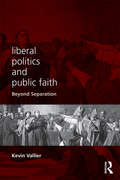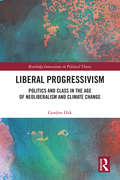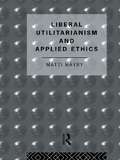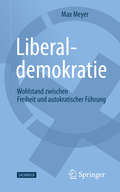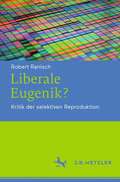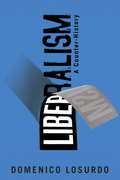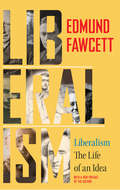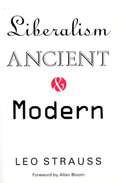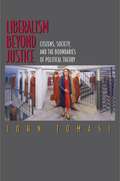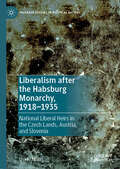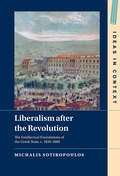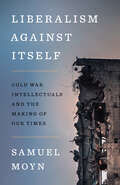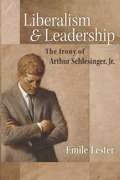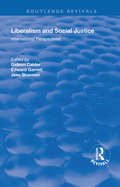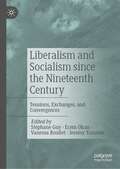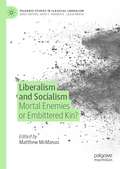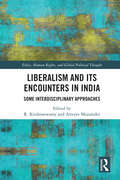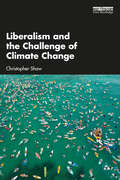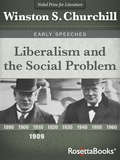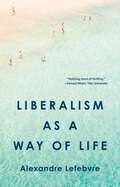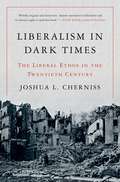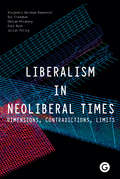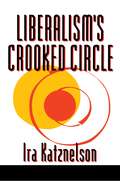- Table View
- List View
Liberal Politics and Public Faith: Beyond Separation
by Kevin VallierIn the eyes of many, liberalism requires the aggressive secularization of social institutions, especially public media and public schools. The unfortunate result is that many Americans have become alienated from the liberal tradition because they believe it threatens their most sacred forms of life. This was not always the case: in American history, the relation between liberalism and religion has often been one of mutual respect and support. In Liberal Politics and Public Faith: Beyond Separation, Kevin Vallier attempts to reestablish mutual respect by developing a liberal political theory that avoids the standard liberal hostility to religious voices in public life. He claims that the dominant form of academic liberalism, public reason liberalism, is far friendlier to religious influences in public life than either its proponents or detractors suppose. The best interpretation of public reason, convergence liberalism, rejects the much-derided "privatization" of religious belief, instead viewing religious contributions to politics as a resource for liberal political institutions. Many books reject privatization, Liberal Politics and Public Faith: Beyond Separation is unique in doing so on liberal grounds.
Liberal Progressivism: Politics and Class in the Age of Neoliberalism and Climate Change (Routledge Innovations in Political Theory)
by Gordon HakIn Liberal Progressivism, Gordon Hak makes the case for the value of theory and philosophy in understanding the day-to-day political realm of elections, politicians, scandals, fund-raising, and law-making. Running through the book is the big question of how political attitudes and actions are philosophically grounded: why do people believe what they do? Framed as a debate between liberal progressivism and the Marxist-informed left, and between liberal progressives and the non-university-educated working class, an informant named "Gord" is introduced. Drawing on his life experience he acts as a guide into the worlds of liberal progressivism, the non-university-educated working class, and the Marxist-informed intellectual-left modes of existence that he has personally experienced. In 11 chapters, the book presents an appreciation of nonbinary relationships, open-ended dialectics, complex systems and equilibrium theory, and the importance of emotions in political life. Through a transdisciplinary approach, the book delves into the interconnecting the worlds of politics, philosophy, anthropology, sociology, history, and epistemology to produce a celebration of political theory which deserves to be widely read by students, scholars and activists.
Liberal Utilitarianism and Applied Ethics (Social Ethics and Policy)
by Matti HayryLiberal Utilitarianism and Applied Ethics explores the foundations of early utilitarianism and, at the same time, the theoretical bases of social ethics and policy in modern Western welfare states. Matti Hayry sees the main reason for utilitarianism's growing disrepute among moral philosophers is that its principles cannot legitimately be extended to situations where the basic needs of the individuals involved are in conflict. He is able to formulate a solution to this fundamental problem by arguing convincingly that by combining a limited version of liberal utilitarianism and the methods of applied ethics, we are able to define our moral duties and rights. Liberal Utilitarianism and Applied Ethics will appeal to students and teachers of philosophy who are interested in the doctrine of utilitarianism or in ethical decison-making.
Liberaldemokratie: Wohlstand zwischen Freiheit und autokratischer Führung
by Max MeyerNoch nie ging es so vielen Menschen so gut. Wohlstand ist aber kein Naturgesetz, er muss erarbeitet werden. Dieses Buch will aufzeigen, welche Faktoren für den Aufstieg erfolgreicher Länder entscheidend waren. Im Vordergrund steht dabei eine liberale Wirtschaft – nicht als politisches System, sondern in Form wirtschaftlicher Spielregeln. Die Spielregeln des freien Marktes stehen politisch weder rechts noch links, denn Liberalismus und Sozialstaat sind keine Gegensätze. Das Fundament nachhaltiger Prosperität bilden Freiheit, Chancengleichheit und ein funktionierender Staat. Bedingung dafür ist eine stabile Demokratie, die nicht von einem Autokraten infrage gestellt werden kann. Zwar können erste Schritte aus der Armut autokratisch effizient erfolgen. Sobald jedoch ein gewisser Wohlstand erreicht ist, verlangen die Menschen nach Wohlbefinden – also nach Freiheit und Mitbestimmung. Nur so treiben sie die Entwicklung weiter voran. Die Beachtung der Menschenrechte ist daher entscheidend. Mit über 40 Jahren Erfahrung als Anwalt, Unternehmer und Verwaltungsrat schildert der Autor dieses Buches in klaren Worten, unter welchen Voraussetzungen der Wohlstand eines Landes nachhaltig gesichert werden kann.
Liberale Eugenik?: Kritik der selektiven Reproduktion
by Robert RanischAnwendungen der Gendiagnostik und Reproduktionsmedizin erlauben es Wunscheltern, immer weiter auf das Erbgut ihrer Nachkommen Einfluss zu nehmen. Eine solche „liberale Eugenik“ wird mittlerweile auch in der Philosophie und Bioethik befürwortet. Wo liegen aber die Ursprünge eines solchen Denkens und wie ist eine umfassende Fortpflanzungsfreiheit zu bewerten? Ausgehend von einer freiheitlichen Ethik leistet die Studie eine immanente Kritik an der liberalen Eugenik und entwirft dabei eine eigene Position zum Umgang mit neuen gentechnischen Möglichkeiten.
Liberalism
by Gregory Elliott Domenico LosurdoIn this definitive historical investigation, Italian author and philosopher Domenico Losurdo argues that from the outset liberalism, as a philosophical position and ideology, has been bound up with the most illiberal of policies: slavery, colonialism, genocide, racism and snobbery.Narrating an intellectual history running from the eighteenth through to the twentieth centuries, Losurdo examines the thought of preeminent liberal writers such as Locke, Burke, Tocqueville, Constant, Bentham, and Sieyès, revealing the inner contradictions of an intellectual position that has exercised a formative influence on today's politics. Among the dominant strains of liberalism, he discerns the counter-currents of more radical positions, lost in the constitution of the modern world order.
Liberalism
by Edmund FawcettLiberalism dominates today's politics just as it decisively shaped the past two hundred years of American and European history. Yet there is striking disagreement about what liberalism really means and how it arose. In this engrossing history of liberalism--the first in English for many decades--veteran political observer Edmund Fawcett traces the ideals, successes, and failures of this central political tradition through the lives and ideas of a rich cast of European and American thinkers and politicians, from the early nineteenth century to today.Using a broad idea of liberalism, the book discusses celebrated thinkers from Constant and Mill to Berlin, Hayek, and Rawls, as well as more neglected figures. Its twentieth-century politicians include Franklin D. Roosevelt, Lyndon Johnson, and Willy Brandt, but also Hoover, Reagan, and Kohl. The story tracks political liberalism from its beginnings in the 1830s to its long, grudging compromise with democracy, through a golden age after 1945 to the present mood of challenge and doubt.Focusing on the United States, Britain, France, and Germany, the book traces how the distinct traditions of these countries converged on the practice of liberal democracy. Although liberalism has many currents, Fawcett suggests that they are held together by shared commitments: resistance to power, faith in social progress, respect for people's chosen enterprises and beliefs, and acceptance that interests and faiths will always conflict.An enlightening account of a vulnerable but critically important political creed, Liberalism will be a revelation for readers who think they already know--for good or ill--what liberalism is.
Liberalism Ancient And Modern
by Leo StraussRevered and reviled, Leo Strauss has left a rich legacy of work that continues to spark discussion and controversy. This volume of essays ranges over critical themes that define Strauss's thought: the tension between reason and revelation in the Western tradition, the philsophical roots of liberal democracy, and especially the conflicting yet complementary relationship between ancient and modern liberalism. For those seeking to become acquainted with this provocative thinker, one need look no further.
Liberalism Beyond Justice: Citizens, Society, and the Boundaries of Political Theory
by John TomasiLiberal regimes shape the ethical outlooks of their citizens, relentlessly influencing their most personal commitments over time. On such issues as abortion, homosexuality, and women's rights, many religious Americans feel pulled between their personal beliefs and their need, as good citizens, to support individual rights. These circumstances, argues John Tomasi, raise new and pressing questions: Is liberalism as successful as it hopes in avoiding the imposition of a single ethical doctrine on all of society? If liberals cannot prevent the spillover of public values into nonpublic domains, how accommodating of diversity can a liberal regime actually be? To what degree can a liberal society be a home even to the people whose viewpoints it was formally designed to include? To meet these questions, Tomasi argues, the boundaries of political liberal theorizing must be redrawn. Political liberalism involves more than an account of justified state coercion and the norms of democratic deliberation. Political liberalism also implies a distinctive account of nonpublic social life, one in which successful human lives must be built across the interface of personal and public values. Tomasi proposes a theory of liberal nonpublic life. To live up to their own deepest commitments to toleration and mutual respect, liberals, he insists, must now rethink their conceptions of social justice, civic education, and citizenship itself. The result is a fresh look at liberal theory and what it means for a liberal society to function well.
Liberalism after the Habsburg Monarchy, 1918–1935: National Liberal Heirs in the Czech Lands, Austria, and Slovenia (Palgrave Studies in Political History)
by Oskar MulejThis book explores what it meant to be ‘liberal ’ in interwar Czech, Austrian, and Slovenian politics. Up until 1918, these countries shared the common political framework of Cisleithania (the Austrian part of the Habsburg Monarchy). Within this framework was the predominantly pejorative function of the label ‘liberal,’ and as a result after 1918, no major political party employed it to describe its own political orientation. Despite making considerable efforts to dissociate themselves from liberalism, many parties continued to be referred to as ‘liberal ’ by the contemporary public. This association with liberalism, the book argues, was primarily due to the parties’ historical background rather than any ideological commitment to liberalism, and for that reason, the author refers to them as ‘national liberal heirs.’ Examining the (dis)continuities of liberal party traditions, the book presents three representative cases of national liberal heirs: the Czechoslovak National Democracy; the Greater German People’s Party; and the Slovenian sections of the Yugoslav Democratic Party, the Independent Democratic Party, and the Yugoslav National Party. Forming a distinctive part of early twentieth-century party landscapes in Central Europe, the national liberal heirs had inherited organisational structures, parts of electorate, as well as rootedness in specific cultural and social milieus from their liberal predecessors. Following the political trajectories of the national liberal heirs, the author seeks to answer in which spheres, in which manners, and to what extent liberalism survived or even continued to develop in the interwar Czech lands, Austria, and Slovenia.
Liberalism after the Revolution: The Intellectual Foundations of the Greek State, c. 1830–1880 (Ideas in Context #143)
by Michalis SotiropoulosHow is a new state built? To what ideas, concepts and practices do authorities turn to produce and legitimise its legal and political system? And what if the state emerged through revolution, and sought to obliterate the legacy of the empire which preceded it? This book addresses these questions by looking at nineteenth-century Greek liberalism and the ways in which it engaged in reforms in the Greek state after independence from the Ottomans (c. 1830-1880). Liberalism after the Revolution offers an original perspective on this dynamic period in European history, and challenges the assumptions of Western-centric histories of nineteenth-century liberalism, and its relationship with the state. Michalis Sotiropoulos shows that, in this European periphery, liberals did not just transform liberalism into a practical mode of statecraft, they preserved liberalism's radical edge at a time when it was losing its appeal elsewhere in Europe.
Liberalism against Itself: Cold War Intellectuals and the Making of Our Times
by Samuel MoynThe Cold War roots of liberalism&’s present crisis &“[A] daring new book.&”—Becca Rothfeld, Washington Post By the middle of the twentieth century, many liberals looked glumly at the world modernity had brought about, with its devastating wars, rising totalitarianism, and permanent nuclear terror. They concluded that, far from offering a solution to these problems, the ideals of the Enlightenment, including emancipation and equality, had instead created them. The historian of political thought Samuel Moyn argues that the liberal intellectuals of the Cold War era—among them Isaiah Berlin, Gertrude Himmelfarb, Karl Popper, Judith Shklar, and Lionel Trilling—transformed liberalism but left a disastrous legacy for our time. In his iconoclastic style, Moyn outlines how Cold War liberals redefined the ideals of their movement and renounced the moral core of the Enlightenment for a more dangerous philosophy: preserving individual liberty at all costs. In denouncing this stance, as well as the recent nostalgia for Cold War liberalism as a means to counter illiberal values, Moyn presents a timely call for a new emancipatory and egalitarian liberal philosophy—a path to undoing the damage of the Cold War and to ensuring the survival of liberalism.
Liberalism and Leadership: The Irony of Arthur Schlesinger, Jr.
by Emile LesterMost scholars and pundits today view Franklin Delano Roosevelt and John F. Kennedy as aggressive liberal leaders, while viewing Schlesinger’s famous histories of their presidencies as celebrations of their steadfast progressive leadership. A more careful reading of Schlesinger’s work demonstrates that he preferred an ironic political outlook emphasizing the virtues of restraint, patience, and discipline. For Schlesinger, Roosevelt and Kennedy were liberal heroes and models as much because they respected the constraints on their power and ideals as because they tested traditional institutions and redefined the boundaries of presidential power. Aggressive liberalism involves the use of inspirational rhetoric and cunning political tactics to expand civil liberties and insure economic equality. Schlesinger’s emphasis on the crucial role that irony has played and should play in liberalism poses a challenge to the aggressive liberalism advocated by liberal activists, political thinkers, and pundits. That his counsel was grounded in conservative insights as well as liberal values makes it accessible to leaders across the political spectrum.
Liberalism and Social Justice: International Perspectives (Avebury Ser. In Philosophy Ser.)
by Gideon Calder Edward GarrettThis title was first published in 2000: Bringing oes liberalism have either the theoretical capacity or the political durability to provide for social justice, particularly given the challenges of the new millennium? From a diverse array of disciplinary, cultural and critical perspectives, the contributors to this timely and incisive collection of essays cover ground ranging from the philosophical adequacy of liberalism’s central tenets, to the treatment of minority and alternative cultures in contemporary Europe, to the future of welfare provision, to the continued tenability of traditional ideological distinctions and labels amid the social conditions and demands of the new millennium. The book will be of particular interest to philosophers, political scientists and social and legal theorists - and to anyone with a general interest in the present and future horizons of social justice in theory and practice.
Liberalism and Socialism since the Nineteenth Century: Tensions, Exchanges, and Convergences
by Vanessa Boullet Stéphane Guy Ecem Okan Jeremy TranmerThis book aims to re-evaluate the relations between two major ideologies that have been increasingly contested in recent years, yet continue to be invoked or rejected as foundational systems for political thought or action. With socialism conceiving of itself as an alternative to economic liberalism, the two systems of thought emerged partially in opposition to each other. However, this book seeks to redefine their specificities and the way in which they have not only opposed each other but drew on common notions or paradigms to become both competing and complementary systems of thought and practices. With contributions from eminent political scientists and historians of political and economic thought, the book examines how the polarisation of debates and politicisation of concepts such as property, freedom, the individual, or the State, serve to construct the adversary and form a basis for political commitment. Offering an interdisciplinary assessment of the relation between liberalism and socialism, the authors help to make sense of current debate on individual freedom, political obligation and the changing role of the State. Providing an innovative perspective, this edited collection will be of interest to scholars and students researching political and economic thought, history or science, as well as anyone seeking to understand current developments affecting Western societies, and their past, present, and future ideologies.
Liberalism and Socialism: Mortal Enemies or Embittered Kin? (Palgrave Studies in Classical Liberalism)
by Matthew McManusIn times of pandemic and global economic crisis, little more than a decade after the last, there are serious questions about how the liberal order can stand, who its friends are, and what the future will look like. This edited collection provides a comprehensive overview of the principles and stakes at play in the dispute between liberalism and socialism. It explores the 21st century appeal of socialism, particularly to millennials and other relatively young citizens, and shows why modern classical liberalism and neoliberalism have generated tepid support, leading to the resurgence of socialism after it was thought dead and buried due to the dramatic failures of statist models in 1989. The authors put modern socialism and liberalism into renewed dialogue with another to examine whether the two can coexist peacefully, or even reach an overlapping consensus on social reform going forward. It delves into the history and theory of both liberalism and socialism to determine points of overlap and tension, in addition to a cross-disciplinary interpretive analysis of the present epoch to determine how both traditions have evolved since the 20th century. The book is interdisciplinary and provides a broad array of perspectives including a diversity of ideological perspectives ranging from committed Marxists to libertarians. It will be of interest to academics and students in economics and contemporary political culture.
Liberalism and its Encounters in India: Some Interdisciplinary Approaches (Ethics, Human Rights and Global Political Thought)
by Atreyee Majumder R. KrishnaswamyThis book explores the future of liberalism in India. It moves away from traditional approaches and draws upon resources from other disciplines – those subjects which some might think don’t strictly fall under political science or theory – like anthropology, literature, philosophy — to critically engage with the condition of late capitalist modernity in India. The essays in the volume trace liberalism's journey through modern Indian history to give us a new standpoint to understand current debates and also point to some internal contradictions of Indian liberalism. The volume will be of importance to scholars and researchers of political science, especially political theory, and South Asian studies.
Liberalism and the Challenge of Climate Change
by Christopher ShawIn this book Christopher Shaw analyses how liberalism has shaped our understanding of climate change and how liberalism is legitimated in the face of a crisis for which liberalism has no answers. The language and symbolism we use to make sense of climate change arose in the post-World War II liberal institutions of the West. This language and symbolism, in neutralising the philosophical and ideological challenge climate change poses to the legitimacy of free market liberalism, has also closed off the possibility of imagining a different kind of future for humanity. The book is structured around a repurposing of the ‘guardrail’ concept, commonly used in climate science narratives to communicate the boundary between safe and dangerous climate change. Five discursive ‘guardrails’ are identified, which define a boundary between safe and dangerous ideas about how to respond to climate change. The theoretical treatment of these issues is complemented with data from interviews with opinion-formers, decision-makers and campaigners, exploring what models of human nature and political possibilities guide their approach to the politics of climate change governance. This book will be of great interest to students and scholars of climate change, liberal politics, environmental communication and environmental politics and philosophy, in general.
Liberalism and the Challenge of Climate Change
by Christopher ShawIn this book Christopher Shaw analyses how liberalism has shaped our understanding of climate change and how liberalism is legitimated in the face of a crisis for which liberalism has no answers.The language and symbolism we use to make sense of climate change arose in the post-World War II liberal institutions of the West. This language and symbolism, in neutralising the philosophical and ideological challenge climate change poses to the legitimacy of free market liberalism, has also closed off the possibility of imagining a different kind of future for humanity. The book is structured around a repurposing of the ‘guardrail’ concept, commonly used in climate science narratives to communicate the boundary between safe and dangerous climate change. Five discursive ‘guardrails’ are identified, which define a boundary between safe and dangerous ideas about how to respond to climate change. The theoretical treatment of these issues is complemented with data from interviews with opinion-formers, decision-makers and campaigners, exploring what models of human nature and political possibilities guide their approach to the politics of climate change governance.This book will be of great interest to students and scholars of climate change, liberal politics, environmental communication and environmental politics and philosophy, in general.
Liberalism and the Moral Life
by Nancy L. RosenblumLiberalism and the Moral Life presents the thoughts of 12 prominent scholars who are re-drawing the map of liberalism. In essays that go beyond the usual defence of liberalism based on moral scepticism or the possibility of discovering neutral principles, these writers consider possibilities for reinventing liberal thought.
Liberalism and the Social Problem: A Collection Of Early Speeches As A Member Of Parliament (Winston S. Churchill Early Speeches)
by Winston S. ChurchillThis collection of speeches from 1906 to 1909 documents Churchill&’s early years as a Member of the Liberal Party in the House of Commons. Sir Winston Churchill is admired as a brilliant Conservative politician and statesman—but he wasn't always a Conservative. In 1904, he crossed over to join the Liberal party, becoming Under-Secretary of State for the Colonies and later joining the Liberal Cabinet. This collection of his speeches reveals Churchill's dramatic shift toward a more progressive governing philosophy. Here, the young MP&’s fervently argues his positions on some of the most important issues of the time, including the "People's Budget," a highly controversial new wealth distribution initiative. The resulting conflict between the House of Lords and the House of Commons led to the passage of the Parliament Act of 1911, asserting the House of Commons' legislative powers. This compilation of speeches is both an enlightening historical document and a fascinating display of the future Prime Minister&’s political insights and oratory skill.
Liberalism as a Way of Life
by Alexandre LefebvreWhy liberalism is all you need to lead a good, fun, worthy, and rewarding life—and how you can become a better and happier person by taking your liberal beliefs more seriouslyWhere do you get your values and sensibilities from? If you grew up in a Western democracy, the answer is probably liberalism. Conservatives are right about one thing: liberalism is the ideology of our times, as omnipresent as religion once was. Yet, as Alexandre Lefebvre argues in Liberalism as a Way of Life, many of us are liberal without fully realizing it—or grasping what it means. Misled into thinking that liberalism is confined to politics, we fail to recognize that it&’s the water we swim in, saturating every area of public and private life, shaping our psychological and spiritual outlooks, and influencing our moral and aesthetic values—our sense of what is right, wrong, good, bad, funny, worthwhile, and more. This eye-opening book shows how so many of us are liberal to the core, why liberalism provides the basis for a good life, and how we can make our lives better and happier by becoming more aware of, and more committed to, the beliefs we already hold.A lively, engaging, and uplifting guide to living well, the liberal way, Liberalism as a Way of Life is filled with examples from television, movies, stand-up comedy, and social media—from Parks and Recreation and The Good Place to the Borat movies and Hannah Gadsby. Along the way, you&’ll also learn about seventeen benefits of being a liberal—including generosity, humor, cheer, gratitude, tolerance, and peace of mind—and practical exercises to increase these rewards.You&’re probably already waist-deep in the waters of liberalism. Liberalism as a Way of Life invites you to dive in.
Liberalism in Dark Times: The Liberal Ethos in the Twentieth Century
by Joshua L. ChernissA timely defense of liberalism that draws vital lessons from its greatest midcentury proponentsToday, liberalism faces threats from across the political spectrum. While right-wing populists and leftist purists righteously violate liberal norms, theorists of liberalism seem to have little to say. In Liberalism in Dark Times, Joshua Cherniss issues a rousing defense of the liberal tradition, drawing on a neglected strand of liberal thought.Assaults on liberalism—a political order characterized by limits on political power and respect for individual rights—are nothing new. Early in the twentieth century, democracy was under attack around the world, with one country after another succumbing to dictatorship. While many intellectuals dismissed liberalism as outdated, unrealistic, or unworthy, a handful of writers defended and reinvigorated the liberal ideal, including Max Weber, Raymond Aron, Albert Camus, Reinhold Niebuhr, and Isaiah Berlin—each of whom is given a compelling new assessment here.Building on the work of these thinkers, Cherniss urges us to imagine liberalism not as a set of policies but as a temperament or disposition—one marked by openness to complexity, willingness to acknowledge uncertainty, tolerance for difference, and resistance to ruthlessness. In the face of rising political fanaticism, he persuasively argues for the continuing importance of this liberal ethos.
Liberalism in Neoliberal Times: Dimensions, Contradictions, Limits (Goldsmiths Press Ser.)
by Des Freedman Kate Nash Julian Petley Gholam Khiabany Alejandro Abraham-HamanoielAn exploration of the theories, histories, practices, and contradictions of liberalism today.What does it mean to be a liberal in neoliberal times? This collection of short essays attempts to show how liberals and the wider concept of liberalism remain relevant in what many perceive to be a highly illiberal age. Liberalism in the broader sense revolves around tolerance, progress, humanitarianism, objectivity, reason, democracy, and human rights. Liberalism's emphasis on individual rights opened a theoretical pathway to neoliberalism, through private property, a classically minimal liberal state, and the efficiency of “free markets.” In practice, neoliberalism is associated less with the economic deregulation championed by its advocates than the re-regulation of the economy to protect financial capital. Liberalism in Neoliberal Times engages with the theories, histories, practices, and contradictions of liberalism, viewing it in relation to four central areas of public life: human rights, ethnicity and gender, education, and the media. The contributors explore the transformations in as well as the transformative aspects of liberalism and highlight both its liberating and limiting capacities. The book contends that liberalism—in all its forms—continues to underpin specific institutions such as the university, the free press, the courts, and, of course, parliamentary democracy. Liberal ideas are regularly mobilized in areas such as counterterrorism, minority rights, privacy, and the pursuit of knowledge. This book contends that while we may not agree on much, we can certainly agree that an understanding of liberalism and its emancipatory capacity is simply too important to be left to the liberalsContributorsAlejandro Abraham-Hamanoiel, Patrick Ainley, Abdullahi An-Na'im, Michael Bailey, Haim Bresheeth, Başak Çalı, David Chandler, William Davies, Costas Douzinas, Natalie Fenton, Des Freedman, Roberto Gargarella, Priyamvada Gopal, Jonathan Hardy, John Holmwood, Ratna Kapur, Gholam Khiabany, Ray Kiely, Monika Krause, Deepa Kumar, Arun Kundnani, Colin Leys, Howard Littler, Kathleen Lynch, Robert W. McChesney, Nivedita Menon, Toby Miller, Kate Nash, Joan Pedro-Carañana, Julian Petley, Anne Phillips, Jonathan Rosenhead, Annabelle Sreberny, John Steel, Michael Wayne, Milly Williamson
Liberalism's Crooked Circle: Letters to Adam Michnik
by Ira KatznelsonThis book is a profoundly moving and analytically incisive attempt to shift the terms of discussion in American politics. It speaks to the intellectual and political weaknesses within the liberal tradition that have put the United States at the mercy of libertarian, authoritarian populist, nakedly racist, and traditionalist elitist versions of the right-wing; and it seeks to identify resources that can move the left away from the stunned intellectual incoherence with which it has met the death of Bolshevism. In Ira Katznelson's view, Americans are squandering a tremendous ethical and political opportunity to redefine and reorient the liberal tradition. In an opening essay and two remarkable letters addressed to Adam Michnik, who is arguably East Europe's emblematic democratic intellectual, Katznelson seeks to recover this possibility. By examining issues that once occupied Michnik's fellow dissidents in the Warsaw group known as the Crooked Circle, Katznelson brings a fresh realism to old ideals and posits a liberalism that "stares hard" at cruelty, suffering, coercion, and tyrannical abuses of state power. Like the members of Michnik's club, he recognizes that the circumference of liberalism's circle never runs smooth and that tolerance requires extremely difficult judgments. Katznelson's first letter explores how the virtues of socialism, including its moral stand on social justice, can be related to liberalism while overcoming debilitating aspects of the socialist inheritance. The second asks whether liberalism can recognize, appreciate, and manage human difference. Situated in the lineage of efforts by Richard Hofstadter, C. Wright Mills, and Lionel Trilling to "thicken" liberalism, these letters also draw on personal experience in the radical politics of the 1960s and in the dissident culture of East and Central Europe in the years immediately preceding communism's demise. Liberalism's Crooked Circle could help foster a substantive debate in the American elections of 1996 and determine the contents of that desperately needed discussion.
